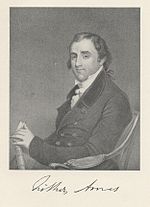Benjamin Fairbanks
| Part of a series on the |
| History of Dedham |
|---|
 |
| Main article |
| Dedham, Massachusetts |
| By year |
| By topic |
Benjamin Fairbanks was an 18th century farmer and selectmen from Dedham, Massachusetts who received the lightest sentence of anyone ever convicted under the Sedition Act of 1798.[1][2]
Fairbanks was charged with having a role in erecting the liberty pole in Dedham, along with David Brown. Brown held the ladder while another, presumably Fairbanks, put up a seditious sign on it.[3]
When it appeared, Fisher Ames and the rest of Dedham's Federalist community were enraged.[4] The pole was taken down[5] and the culprits were sought. Fairbanks, a prosperous farmer and former Selectman but also an "impressionable, rather excitable man," was quickly arrested[4] on November 6, 1798.[2] He was brought to Boston by the United States Marshal for the district, and accompanied by men from a neighboring community.[6] He was questioned the same evening by Judge John Lowell.[6]
He posted bond and was scheduled for trail the following June at the Federal Circuit Court in Boston.[4][6][2] When the trial came, Fairbanks requested the legal aid of Ames. While Ames declined to serve as the defendant's attorney, he did appear as a character witness.[1] Fairbanks, facing the "powerful forces" arrayed against him, confessed on June 8.[7]
Fairbanks said that "it was not then known by me, nor perhaps by others concerned, how heinous an offense it was."[7][8] He then added that he was a patriotic citizen, and would attempt to live his life accordingly in the future.[7] Justice Samuel Chase sentenced Fairbanks to six hours in prison and a fine of five dollars, plus court costs, the lightest sentence ever given for any of the Sedition Act defendants.[1][8] When Thomas Jefferson became president, one of his first acts was to issue a general pardon for any person convicted under the Sedition Act.[9]
Family
He was a descendant of Jonathan Fairebanke, builder of the Fairbanks House.[4] He was also related to Jason Fairbanks, the murderer, and Vice President Charles Fairbanks.
References
- ^ a b c Slack 2015, p. 179.
- ^ a b c Phillip I. Blumberg (30 September 2010). Repressive Jurisprudence in the Early American Republic: The First Amendment and the Legacy of English Law. Cambridge University Press. p. 134. ISBN 978-1-139-49002-3.
- ^ Slack 2015, p. 140.
- ^ a b c d Slack 2015, p. 138.
- ^ Slack 2015, p. 141.
- ^ a b c Richard N. Rosenfeld; Edmund S. Morgan (15 September 1998). American Aurora: A Democratic-Republican Returns: The Suppressed History of Our Nation's Beginnings and the Heroic Newspaper That Tried to Report It. St. Martin's Press. p. 541. ISBN 978-0-312-19437-6.
- ^ a b c Slack 2015, p. 178.
- ^ a b Belt, Gordon T. "Sedition Act of 1798 – a brief history of arrests, indictments, mistreatment & abuse" (pdf). First Amendment Center. Retrieved October 25, 2016.
- ^ Slack 2015, p. 232.
Works cited
- Slack, Charles (2015). Liberty's First Crisis: Adams, Jefferson, and the Misfits Who Saved Free Speech. Atlantic Monthly Press. ISBN 978-0802123428.
